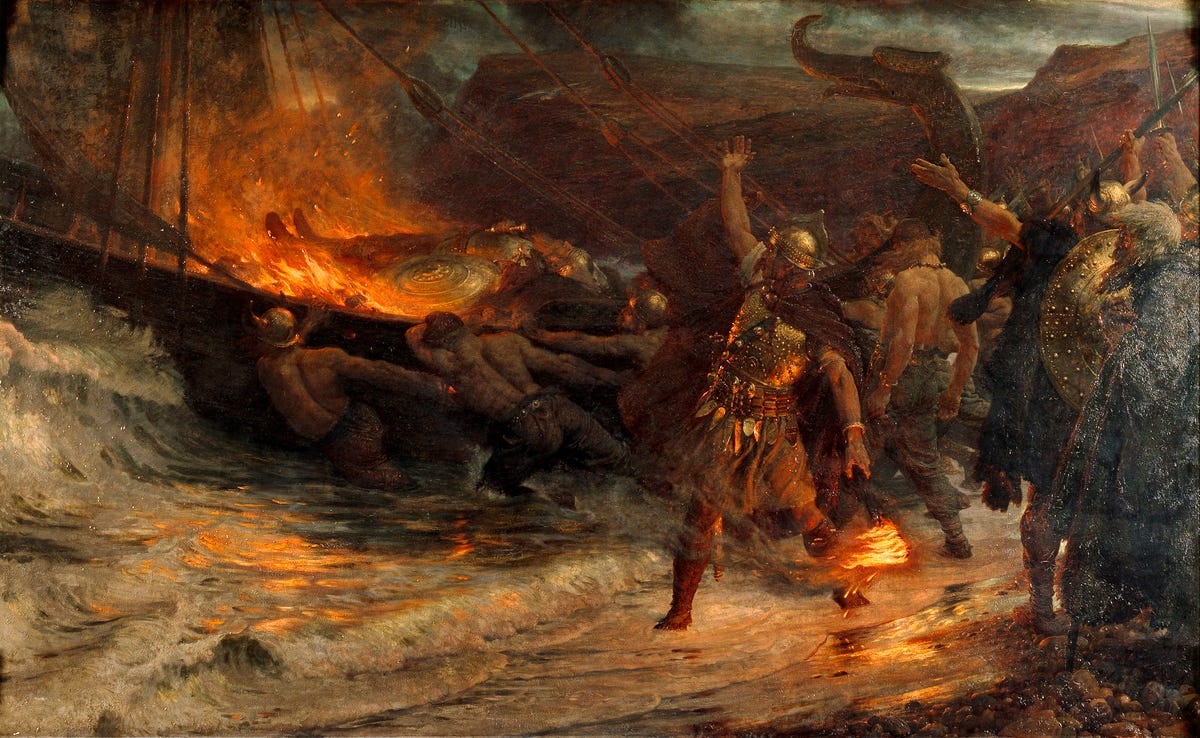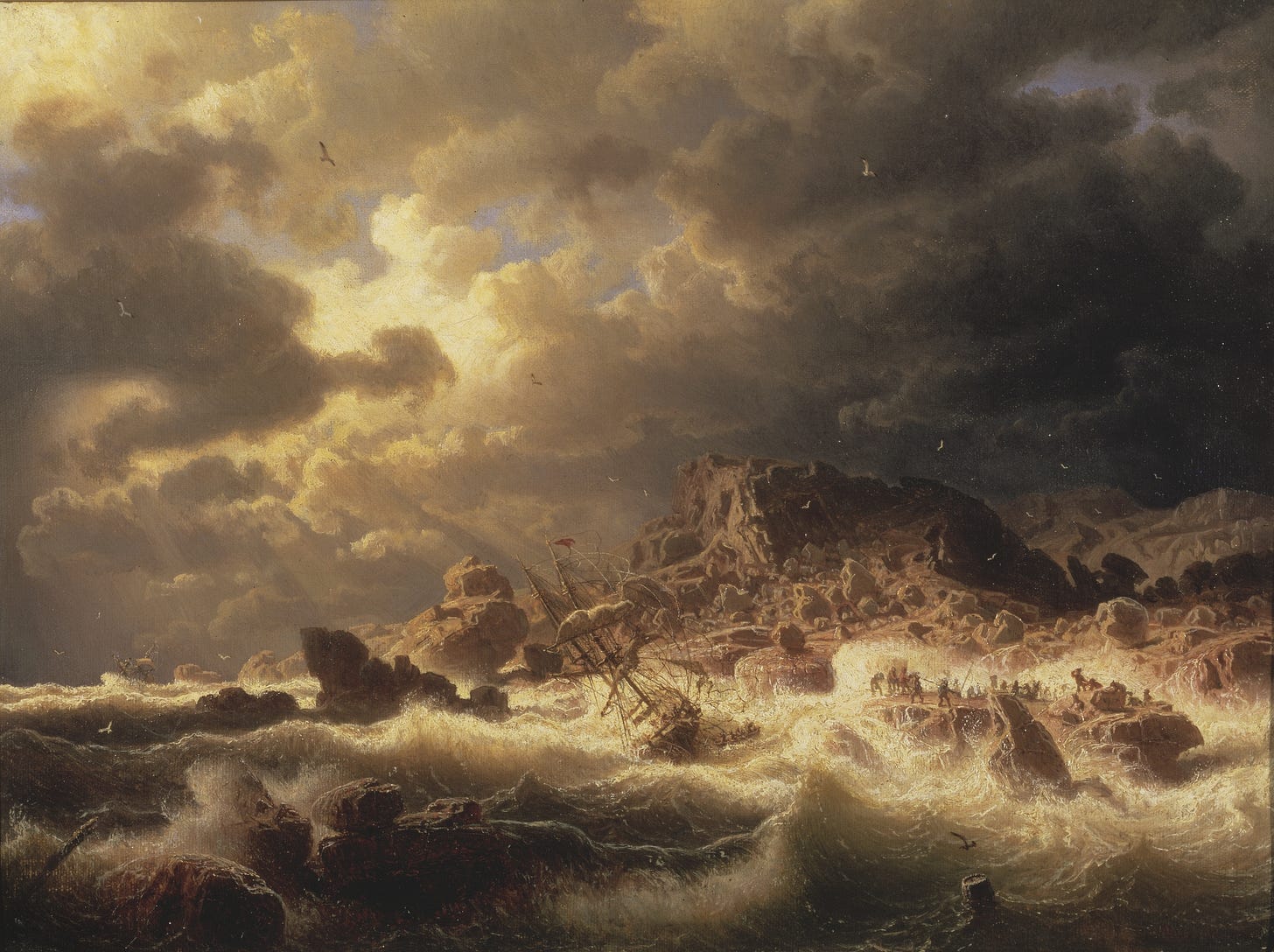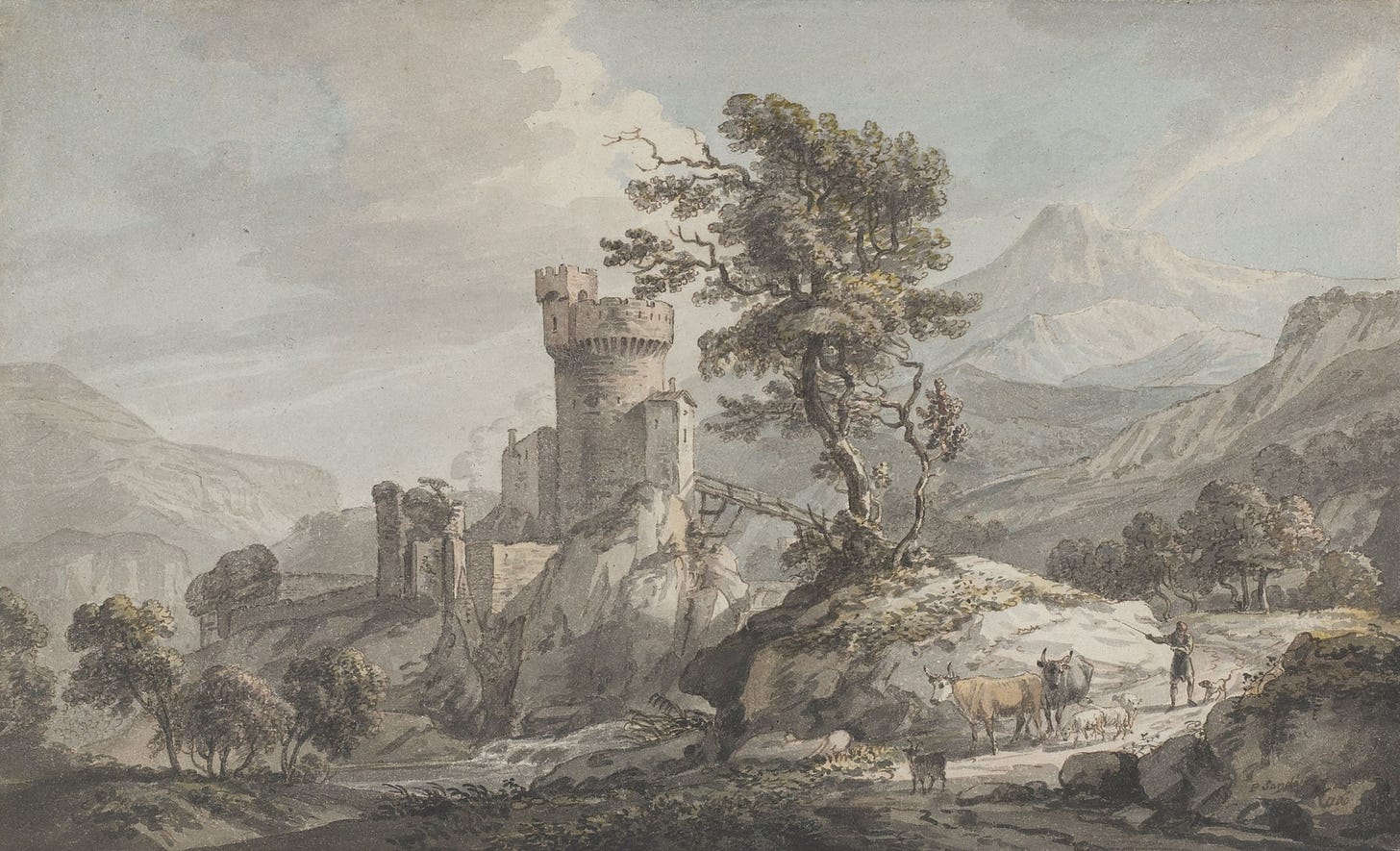Don’t read Heaney’s Beowulf
The cost of a beautiful translation
Reading is so hot right now.
And what people are reading is Great Books. This is a movement that has found new life lately on social media, especially here on Substack. We’re blessed with reading lists and study guides that lead us towards a deeper engagement with culture. It’s no accident that the books which have stood the test of time have become popular in an age of shallowness, disposability, and the tyranny of the algorithm.
As someone who teaches Beowulf professionally, I’m happy that my beloved poem so often makes the cut. But something strange happens on these lists. They all seem to agree on a single translation: Seamus Heaney’s (1999) Beowulf: A New Verse Translation.
And my advice to you is: choose another translation.
Not because Heaney’s Beowulf is bad. It’s actually a great poem. But still, I don’t recommend his translation for people who are reading Beowulf for Great Books purposes: that is, the desire to read literature which illuminates something about history and human nature.
Most people who read Beowulf will only ever read one translation. And if you only read one, it should be what I call a vanilla translation: one whose mild flavour allows the taste of the original to be enjoyed. Reading Heaney’s Beowulf is like pairing a delicate fruit with double chocolate fudge ice cream. It will be delicious, but you won’t taste the fruit.
So it is with Heaney’s translation. If you read only it, you’ll come away with a great understanding of Heaney’s project, but you’ll be kept at an unnecessary distance from the world of Beowulf.
Let me show you what I mean — and what translation I’d recommend if you want to come away from Beowulf having had a direct experience with the world of the poem — at least, as direct as is possible over the gulf that separates the two languages.
Because Beowulf is worth knowing. It’s worth knowing as the crowning achievement of Old English poetry. It’s also worth knowing as a portal into the deep prehistory of the linguistic ancestors of the English-speaking peoples. But, more than anything, it’s worth knowing as a meditation on courage, honour, and the fleeting joys of youth and strength.
You're reading The Dead Language Society. I'm Colin Gorrie, linguist, ancient language teacher, and your guide through the history of the English language and its relatives.
Subscribe for a free issue every Wednesday, or upgrade to support my mission of bringing historical linguistics out of the ivory tower and receive two extra Saturday deep-dives per month.
What is Beowulf
Beowulf is a heroic poem of just over 3000 lines written in Old English. Its author is unknown. It comes to us in a single manuscript written around AD 1025, although in many ways the language of the poem looks much older. No one knows exactly when it was written, but scholars who have looked at the characteristics of the poem’s language agree that it was probably sometime in the 8th century AD.
The poem is about a legendary hero named, no surprise, Beowulf,1 who, over the course of his life, kills three monsters: an ogre-like creature named Grendel, Grendel’s mother, and a dragon. The first two of these fights take place in Beowulf’s youth; the third when he is an old man.
Funnily enough, the only thing English about Beowulf is the language it’s written in. Like in many of Shakespeare’s plays, none of the characters in the poem is English. Not a single action in the poem takes place in England. In fact, everything takes place in Scandinavia. Some of the characters and events are, however, historical — or, at least, quasi-historical. As a result, we can figure out roughly when the story takes place: in the late 5th–early 6th centuries.
This means that the action takes place before the conversion of the Anglo-Saxons or their ancestors to Christianity. But the writing took place after the conversion, which leads to an interesting tension in the poem between the Christian values and perspective of the poet and his audience, and the pre-Christian, heroic values of the characters. Much of the fun of reading Beowulf is experiencing how the poet tried to “solve” this problem.
It comes as a surprise to new readers that, apart from the action of the three monster fights, large swaths of the poem consist of stories within stories, referring to characters and events in what I call the Germanic Expanded Universe. These are often versions of stories we know from other texts in other languages. For example, we hear about the exploits of Sigemund the Dragon-Slayer, which is an early version of material from the later Vǫlsunga Saga.
Finally, the story itself is told with great skill: the narrator handles with equal success not only battle scenes, but wry humour, emotional speeches, and touching meditations on the transience of life.
That is why we read Beowulf. So why don’t I want you to start with Heaney’s translation?
In praise of vanilla
Consider the existence of the Germanic Expanded Universe. The Beowulf poet assumed his audience knew a web of interconnected stories about legendary heroes and villains, their feuds and their great deeds.
For example, after Beowulf has defeated the monster Grendel and restored order to the great hall of Denmark, a court poet sings about Sigemund’s exploits, foreshadowing Beowulf’s eventual fatal fight against the dragon in the final part of the poem.
Later, when Beowulf returns home, he foretells a disaster that will occur when the Danish king’s daughter marries a hero named Ingeld. A fuller version of this story is told centuries later in the works of the Danish historian Saxo Grammaticus.
These side stories, which are mostly just allusions in Beowulf, are told in greater detail in texts written in other languages, in other centuries. In other words, they survived generations of transmission and migration to be told from Iceland to Germany, in some cases over a period of 500 years. This shows how fundamental these stories were, and how the Beowulf poet was placing his narrative within this larger Germanic Expanded Universe.
And here is where Heaney doesn’t help us: his localized language transports us from Iron Age Scandinavia to rural Ulster, into Heaney’s own world.
Heaney’s world is a captivating one, to be sure. But it is not quite the world of Beowulf.
So.
What Heaney found in Beowulf was a voice that he recognized from his youth in Ulster. In Heaney’s own words, it was “a familiar local voice, one that had belonged to relatives of my father's, people whom I had once described in a poem as ‘big voiced Scullions.’”2
The voice comes through in the first lines — even the first word — of his translation:
So. The Spear-Danes in days gone by
and the kings who ruled them had courage and greatness.
We have heard of those princes' heroic campaigns.
Here, So. translates the Old English word hwæt,3 an enigmatic word that has traditionally been interpreted as an interjection like “Hey!”, or “Listen!” A more recent understanding of hwæt is that it functions like the word how in sentences like How the mighty have fallen!4
These first lines give you a good sense of Heaney’s priorities in translating the poem. His Beowulf is homespun and intimate.
Let’s compare it to the original Old English:
Hwæt we Gardena in geardagum,
þeodcyninga þrym gefrunon,
hu ða æþelingas ellen fremedon. (1–3)
‘How we have heard of the force of the kings
of the Spear-Danes in days of yore,
how the noblemen performed deeds of courage.’
The translation I’ve given here is a literal (and wholly unpoetic) rendering, so that you can get a sense of the syntax. Notice how Heaney’s version cuts the first sentence in two with a period after greatness. The effect is a more plain-spoken poem.
Heaney was looking for “a narrative line that sounded as if it meant business” and “was prepared to sacrifice other things in pursuit of this directness of utterance.”5
But directness of utterance is not how I’d characterize the style of Beowulf, as we can see even in the first three lines. The poet tells us about the þrym ‘violence, force, glory’ of the Spear-Danes first in one word, and then again in the clause ða æþelingas ellen fremedon ‘the noblemen performed deeds of courage.’
In general, the Beowulf poet is never content to say anything once that could be said two or three times, showing off a different aspect of the topic with each repetition, as if twirling a sparkling gemstone.
True, Old English poetry is not complex in the way of, say, Homer’s intricate syntax. But it is elaborate. It’s often grand. And Heaney seeks to undercut this grandeur at every turn.
Gumption
Witness the words of the Danish sea-warden, after he decides the armed men who have arrived on the shore are no threat.
Heaney:
Anyone with gumption
and a sharp mind will take the measure
of two things: what's said and what's done.
And the Old English, along with my unartistic translation:
Æghwæþres sceal
scearp scyldwiga gescad witan
worda ond worca, se þe wel þenceð. (287b–289)
‘Between each (of the following things)
A sharp shield-warrior must know the difference:
words and deeds, he who thinks well.’
Here, “thinking well” is thinking clearly, being of sound mind. In Heaney’s version, this is reduced to the folksy “gumption.”
The effect is one of deflation: this is an encounter between a border guard and a band of armed men, wearing the most expensive gear available, who have come unannounced to the hall of the Danish king. In the words of the Swedish archaeologist Bo Gräslund:
“Appearing in public wearing a mail shirt and helmet… could be compared in modern-day terms, to cruising along in a Rolls Royce Cloud… with an escort of police motorcycle outriders.”6
This is a high-level diplomatic — or military — mission: the guard’s task is to determine which it is. To describe this as a situation requiring “gumption” risks us not taking this as seriously as the guard inevitably would have.
But this intimate, folksy voice is the one Heaney chose — and he did so consciously. Finding this voice was the key, as Heaney tells it, that unlocked the world of the poem for him. But does it unlock the poem for the rest of us?
No bawns about it
By now, you have a sense for Heaney’s overall aesthetic priorities, which are an imperfect match for the sensibility of the poem. But this is not the biggest issue from the perspective of someone looking for unimpeded access to the world of Beowulf.
Where Heaney wanders farthest from vanilla — entirely by design — is in his use of Ulster dialect words and words which have very particular Irish historical resonances.
The example that sticks out the most is Heaney’s use of the word bawn to refer to Heorot (literally ‘Hart’ or ‘Deer’), the mead-hall of the Danish king, which the monster Grendel assaults. For example,
Spurned and joyless, [Grendel] journeyed on ahead
and arrived at the bawn. (720–721a)
I’ll let Heaney explain what a bawn is:
“In Elizabethan English, bawn… referred specifically to the fortified dwellings which the English planters built in Ireland to keep the dispossessed natives at bay, so it seemed the proper term to apply to the embattled keep where Hrothgar waits and watches.”7
There is nothing wrong with this: calling Heorot a bawn is interesting. But if you only ever read about Heorot as a bawn, you’re not going to understand what the Modern English word means without a dictionary. Maybe I’m old-fashioned, but a translation should not itself require translation.
Not only that, but these Ulsterisms also bring a whole host of new associations into the poem:
“Putting a bawn into Beowulf seems one way for an Irish poet to come to terms with that complex history of conquest and colony, absorption and resistance, integrity and antagonism.”8
These associations are enriching. But you can only enrich what you already have. And if you’ve only ever read Heaney’s Beowulf, much of the force of this creative juxtaposition of bawn and mead-hall is lost.
These Ulsterisms occur throughout Heaney’s Beowulf, making it a richer poem but a more troublesome translation.
What to read instead
Instead, I would point you to one of two translations written by scholars of the Old English language. These are R. M. Liuzza’s (1999) Beowulf and Howell Chickering’s (1977) Beowulf: A Dual-Language Edition.
Each has a wonderful introduction and sparing use of footnotes where necessary to give clarification. Each is very concerned with being your guide into the alien world of the Danes, the Geats, and the kin of Grendel.
The two have different emphases: Liuzza’s goal was to provide “a fluent and accurate text” for readers who do not know Old English. His translation was a success in this regard, and remains very close to the original in its syntax and diction.
Liuzza also incorporates alliteration into the translation (as does Heaney, for the record) — alliteration, rather than rhyme, was the structural device governing Old English poetry.
Here are the first 11 lines of Liuzza’s translation, so you can get a taste:
Listen! We have heard of the glory in bygone days
of the folk-kings of the spear-Danes,
how those noble lords did lofty deeds.
Often Scyld Scefing seized the mead-benches
from many tribes, troops of enemies,
struck fear into earls. Though he first was
found a waif, he awaited solace for that —
he grew under heaven and prospered in honor
until every one of the encircling nations
over the whale's-riding had to obey him,
grant him tribute. That was a good king! (Liuzza, 1–11)
Chickering’s translation, on the other hand, hews less closely to the original than Liuzza’s on a clause-by-clause level, and does not attempt to recreate the alliteration of the Old English version. This allows Chickering more freedom to express what he sees as the meaning in fluent Modern English. Here is an example of the style of the translation:
Listen! We have heard of the glory of the Spear-Danes
in the old days, the kings of tribes—
how noble princes showed great courage!
Often Scyld Scefing seized mead-benches
from enemy troops, from many a clan;
he terrified warriors, even though first he was found
a waif, helpless. For that came a remedy,
he grew under heaven, prospered in honors
until every last one of the bordering nations
beyond the whale-road had to heed him,
pay him tribute. He was a good king! (Chickering, 1–11)
Here’s Heaney’s translation of those same 11 lines, so you can compare apples to apples:
So. The Spear-Danes in days gone by
and the kings who ruled them had courage and greatness. We have heard of those princes' heroic campaigns.
There was Shield Sheafson, scourge of many tribes,
a wrecker of mead-benches, rampaging among foes.
This terror of the hall-troops had come far.
A foundling to start with, he would flourish later on
as his powers waxed and his worth was proved.
In the end each clan on the outlying coasts
beyond the whale-road had to yield to him
and begin to pay tribute. That was one good king. (Heaney, 1–11)
As standalone works of Modern English poetry, each of these Beowulf translations is inferior to Heaney’s. But either Liuzza or Chickering will give you a much clearer road into the world of Beowulf without any unnecessary detours.
Finally, one virtue that all three of Heaney, Liuzza, and Chickering share is that they all give you the Old English alongside their renderings. So if you ever want to learn Old English and check their work, you can do so easily.
I suspect that Heaney’s Beowulf found its way once onto one Great Books reading list and has propagated itself from one list to another by appreciative readers since then.
But the inclusion of Heaney’s Beowulf on these lists is ironic: these lists are meant to give readers an encounter with the foundational texts of the Western tradition. And yet they recommend a Beowulf that interposes Heaney’s idiosyncratic vision between readers and the Scandinavia of the poem.
And, as a result, Heaney’s achievement becomes a beautiful barrier.
This matters because most readers will only encounter Beowulf once. When that single meeting is with Heaney’s “big voiced Scullions” rather than the Iron Age aristocrats of the poem, something important is lost.
So choose Chickering or Liuzza instead. Their translations may not have Heaney’s panache, but they offer you something more valuable: a clearer window into a world where kings deal gold rings from high seats, where heroes hold their honour dearer than their life, and where monsters glide over moors at night to strike at the bonds that hold civilization together.
That world is weird enough as it is.
P.S. While writing this issue, I thought it might be fun to work through one of these translations together! I’m thinking we could do 3 live Zoom sessions over the summer and get through the whole poem (and I’d share all the deep lore from the Germanic Expanded Universe along the way). It’d be a perk for paid subscribers to keep the size manageable. Let me know if you’d be interested!
The poem had no title. We call it Beowulf because it’s about Beowulf.
Heaney (1999). p. xxvii
Etymologically, hwæt is the same word as Modern English what, although used rather differently.
Heaney (1999). p. xxix
Gräslund (2022). p. 30
Heaney (1999). p. xxx
Heaney (1999). p. xxx







Well said. I was lucky enough to know Heaney, a gifted poet and gracious man, but I nonetheless agree with you entirely: his translation, however resonant, is not the best place to start if readers really want a sense of this Old English epic’s foreignness. In exchange for the accessibility and frankness of Heaney’s version, we miss out on the kind of fruitful alienation that results from engaging with the poem’s distant world on its own terms (at least as best we moderns ever can).
I very much appreciate this! We had already chosen Liuzza over Heaney for our translation class (alongside Klaeber) and I’m grateful for this clear and well-written explanation of why.